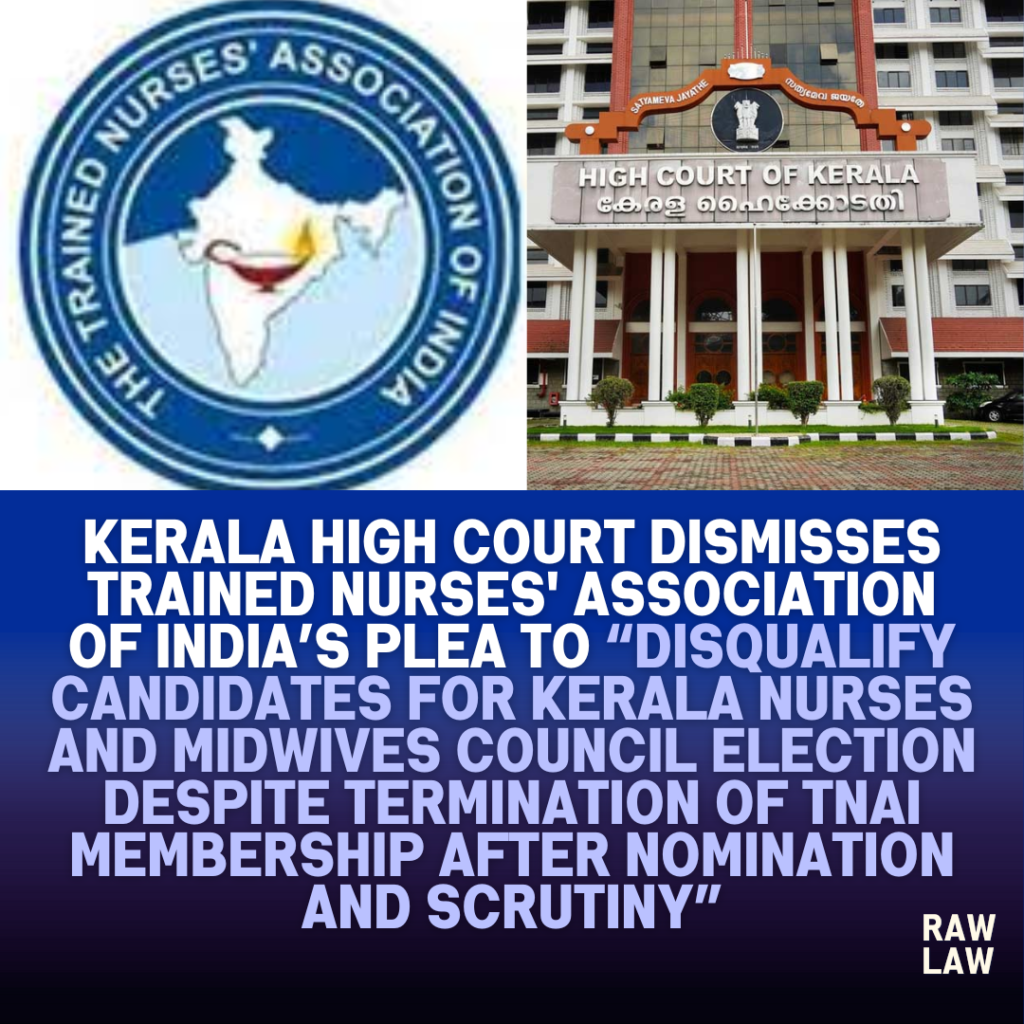Court’s Decision
The Kerala High Court dismissed the writ petition filed by the Trained Nurses’ Association of India (TNAI), which sought to disqualify three candidates from contesting elections to the Kerala Nurses and Midwives Council under the seat reserved for TNAI members due to their membership termination after nomination and scrutiny. The Court held that eligibility must be determined on the date of nomination or at the latest on the date of scrutiny and cannot be disturbed subsequently to unsettle the electoral process.
Facts
TNAI challenged the candidatures of three individuals for the post of Council Member under the reserved quota for TNAI in the Kerala Nurses and Midwives Council elections. TNAI claimed that only its endorsed candidate, Dileep M.K., should contest, and the others were asked to withdraw but did not comply. Subsequently, TNAI terminated their membership. TNAI argued that their termination rendered them ineligible under Section 3(2)(d) of the Kerala Nurses and Midwives Act, 1953. The Returning Officer rejected the objections, citing that their nominations were validly accepted.
Issues
- Whether termination of TNAI membership after nomination and scrutiny disqualifies a candidate from contesting elections under the reserved TNAI seat.
- Whether the endorsement of TNAI is mandatory for eligibility to contest under the reserved seat in the Kerala Nurses and Midwives Council.
- Whether subsequent termination of membership can affect the validity of nominations already accepted by the Returning Officer.
Petitioner’s Arguments
TNAI argued:
- Under Section 3(2)(d) of the Act, only TNAI members are eligible to contest the reserved seat.
- As the candidates’ membership was terminated before the election, they were ineligible.
- Based on N.P. Ponnuswami v. Returning Officer (1952), eligibility must continue until the declaration of election results.
Respondent’s Arguments
The respondents contended:
- They were valid members of TNAI at the time of nomination, scrutiny, and finalisation of the candidate list.
- No clause in the TNAI bye-laws prohibited members from contesting without endorsement.
- Termination after nomination could not retroactively invalidate an accepted nomination.
- Termination was conducted without notice and opportunity to be heard, rendering it invalid.
Analysis of the Law
The Court analysed:
- Section 3(2)(d) of the Kerala Nurses and Midwives Act, 1953, requiring only that the candidate be a TNAI member at the time of nomination for the reserved seat.
- Section 6 of the Act, listing grounds for disqualification, which does not include termination of TNAI membership.
- N.P. Ponnuswami v. Returning Officer (1952), clarifying that elections begin with notification and end with result declaration but eligibility for candidacy is determined at the stage of nomination and scrutiny.
Precedent Analysis
- N.P. Ponnuswami v. Returning Officer (1952): Defined the election process but did not support TNAI’s argument regarding continued membership affecting eligibility after nomination.
- The Court reinforced that election law requires certainty in candidatures, and eligibility must be determined at nomination and scrutiny stages to maintain election stability.
Court’s Reasoning
The Court reasoned:
- The candidates were valid members of TNAI at the time of nomination filing, scrutiny, and publication of the candidate list.
- Accepting post-nomination termination as grounds for ineligibility would destabilise the election process, allowing organisations to manipulate outcomes.
- Section 6 does not provide for disqualification based on loss of membership in the organisation after nomination acceptance.
- The law does not require TNAI’s endorsement for candidates to contest under the reserved seat.
Conclusion
The Kerala High Court dismissed the writ petition, affirming:
- Eligibility is determined at nomination and scrutiny, not affected by later termination of membership.
- TNAI’s endorsement is not a legal requirement for contesting under the reserved seat.
- The electoral process should not be destabilised by post-nomination membership issues.
Implications
- Clarifies that subsequent organisational decisions cannot retroactively affect election nominations.
- Reinforces stability in electoral processes for statutory bodies.
- Affirms that association endorsement is not legally required for reserved seats unless explicitly provided in the statute.
Cases Referred
- N.P. Ponnuswami v. Returning Officer (1952): Clarified the election process but was distinguished to hold that eligibility is fixed at nomination, not subject to post-scrutiny changes.
FAQs
1. Can a candidate’s membership termination after nomination affect eligibility?
No, eligibility is determined at the nomination and scrutiny stages, and subsequent termination does not invalidate candidacy.
2. Is TNAI endorsement required for contesting under the reserved TNAI seat?
No, the Act requires only membership at the nomination stage, not endorsement.
3. Can an association control candidacies post-nomination by terminating memberships?
No, such actions cannot unsettle the electoral process once candidacies are finalised.



